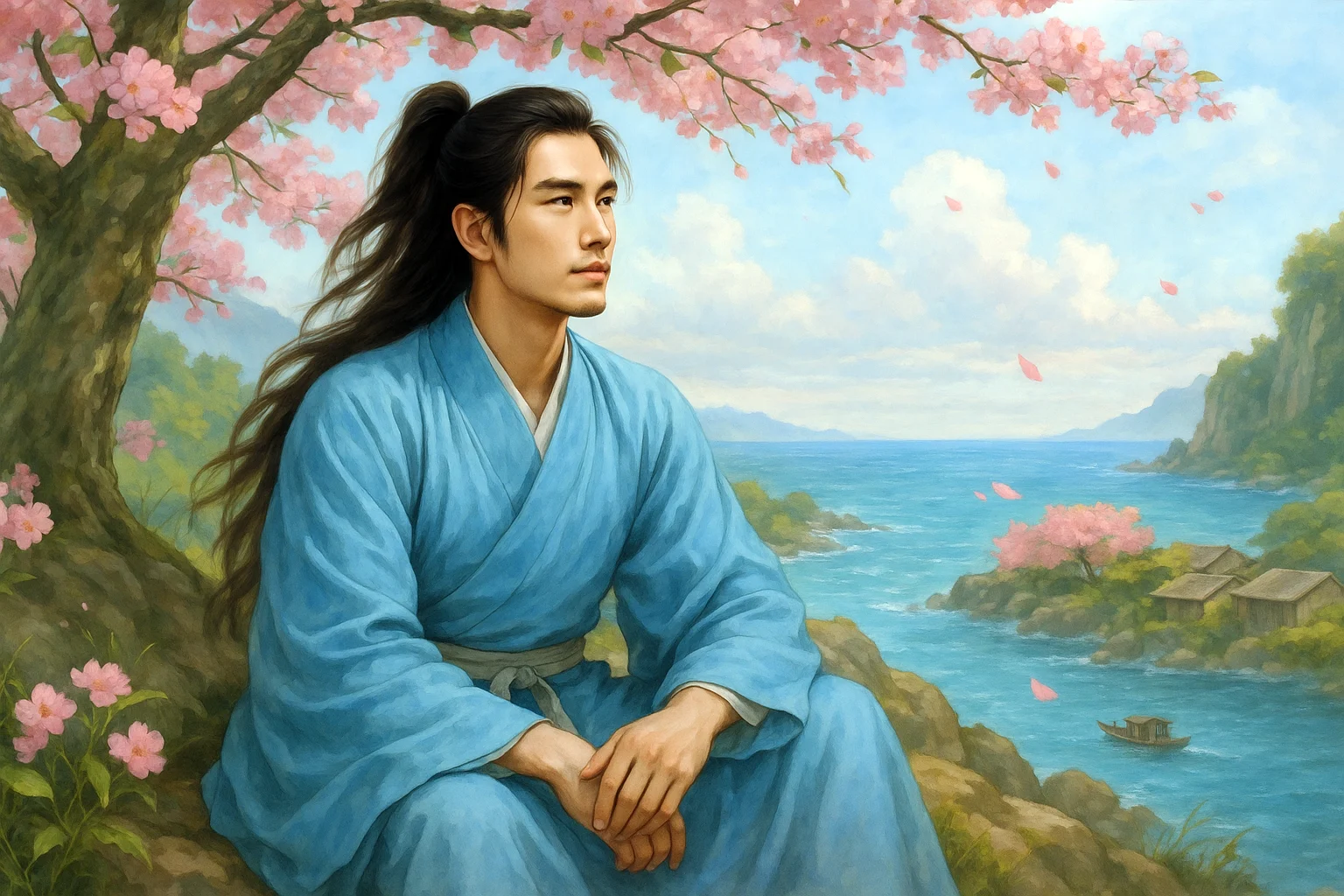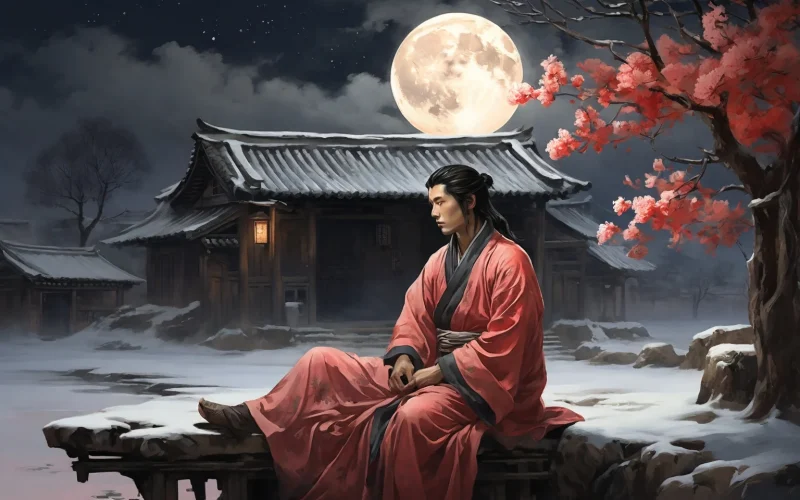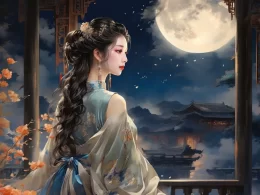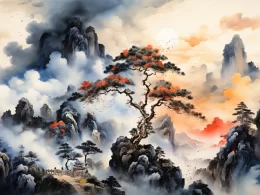Since coming to Luoyang, a stranger here,
You, Master, are the one who holds me dear.
So kind to scholars, humble to the core—
Such virtue men today don’t heed anymore.
Alas! Tonight, in my bare room I stay,
Like nesting birds who mourn woods left in decay.
In gloom I sit till the moon climbs the sky,
Then southern neighbors’ laundry poundings sigh.
Original Poem
「冬夜寓居寄储太祝」
綦毋潜
自为洛阳客,夫子吾知音。
尽义能下士,时人无此心。
奈何离居夜,巢鸟悲空林。
愁坐至月上,复闻南邻砧。
Interpretation
This poem, composed during Qiwu Qian’s sojourn in Luoyang, stands apart from his usual nature-focused verse. Written on a cold, lonely night, it addresses his confidant Chu Taizhu—a rare kindred spirit in an era of fading camaraderie. Through stark imagery and direct emotion, Qiwu laments both physical displacement and the spiritual isolation of a world where genuine bonds fray. The work marries Tang poetry’s classical restraint with raw vulnerability, revealing a man clinging to friendship as winter clings to the earth.
First Couplet: "自为洛阳客,夫子吾知音。"
Zì wéi Luòyáng kè, fūzǐ wú zhīyīn.
Since becoming Luoyang’s transient guest,
you, Master, alone have understood my strings.
The opening lines establish exile and intimacy in equal measure. "Luoyang’s transient guest" (洛阳客) frames the poet as a perpetual outsider, while "understood my strings" (知音) alludes to the legendary friendship between Bo Ya and Zhong Ziqi—symbolizing a connection so profound, it transcends words. Qiwu’s choice of "Master" (夫子) elevates Chu beyond mere friend to spiritual anchor, the sole tether in his uprooted life.
Second Couplet: "尽义能下士,时人无此心。"
Jìn yì néng xià shì, shí rén wú cǐ xīn.
You exhaust duty yet stoop to greet lesser men—
our age lacks such marrow.
Here, Qiwu contrasts Chu’s nobility with contemporary shallowness. "Exhaust duty" (尽义) paints Chu as Confucian ideal—fulfilling obligations without self-importance. "Stoop to greet lesser men" (下士) underscores his humility, a rarity in an era Qiwu implies is marked by opportunism. The phrase "our age lacks such marrow" (时人无此心) cuts deep: what was once virtue is now relic, leaving men like Chu as lonely beacons.
Third Couplet: "奈何离居夜,巢鸟悲空林。"
Nàihé lí jū yè, cháo niǎo bēi kōng lín.
What can we do, parted in this long night?
Like a nest-bird wailing in barren woods.
The mood shifts from tribute to desolation. "Long night" (离居夜) symbolizes both the season and Qiwu’s emotional winter. The "nest-bird" (巢鸟), typically a symbol of domestic warmth, becomes an image of abandoned vulnerability—its cries echoing through "barren woods" (空林), a landscape stripped of solace. The couplet’s power lies in its inversion: the nest, emblem of safety, is now a cage of loneliness.
Fourth Couplet: "愁坐至月上,复闻南邻砧。"
Chóu zuò zhì yuè shàng, fù wén nán lín zhēn.
I sit grieving till the moon climbs,
only to hear southern neighbors’ laundry mallets.
The closing lines masterfully amplify solitude through sensory detail. "Sit grieving" (愁坐) conveys paralyzed sorrow, while the rising moon marks time’s cruel indifference. The distant "laundry mallets" (砧)—a Tang-era soundscape of domestic routine—heighten Qiwu’s alienation. Each thunk is a reminder: life continues for others, but his world remains suspended in longing.
Holistic Appreciation
This is both a poem addressed to a friend and a lament of winter night solitude. Qi Wuqian uses longing for a kindred spirit to express his own melancholy while living alone in a distant land. The first two lines focus on the person, expressing admiration for the friend’s noble character; the latter two lines shift to scenery and emotion, employing imagery like "nesting birds mourning the woods" and "the sound of washing mallets reaching the ears" to evoke the loneliness of deep night and restless thoughts. The poet deftly contrasts the warmth of friendship with the coldness of human nature, the stillness of night with the clamor of the heart, giving the poem strong emotional resonance and reflecting his deep appreciation for friendship and clear-eyed awareness of reality.
Artistic Merits
This poem employs simple and natural language, yet conveys profound emotions. Qi Wuqian excels at depicting complex emotional worlds through concise expression. The entire poem utilizes contrast, juxtaposing the friend's "devotion to righteous service" with "the lack of such virtue among contemporaries," highlighting the friend's exceptional worth. The poem also makes skillful use of imagery, such as "nesting birds mourning the empty woods" and "the sound of washing mallets from southern neighbors," to evoke loneliness and homesickness, intensifying the emotional impact. The four lines progress layer by layer, moving from recording friendship and personal virtues to solitary nighttime lyricism, with a tight structure and seamless fusion of scene and sentiment, creating powerful tension.
Insights
This poem reveals Qi Wuqian, as a Tang dynasty literatus, clinging to friendship and sensitive to reality. With a calm and restrained style, he expresses deep and sincere emotions, also reflecting the ancient sentiment of "how rare to find a true friend." In modern society, such poetry reminds us to cherish those who truly understand us and teaches us to preserve warmth and clarity of heart even in solitude. The faint melancholy and profound affection in the poem remain moving to this day.
About the Poet

Qiwu Qian (綦毋潜 692–c. 755), a native of Ganzhou (modern-day Ganzhou, Jiangxi), was a representative poet of the Landscape and Pastoral School during the High Tang period. He earned the jinshi degree in 726 (the 14th year of the Kaiyuan era) and held official positions such as Right Reminder (You Shiyi) and Editorial Director (Zhuzuo Lang) before retiring to the Jiangnan region. His poetry, renowned for its depictions of reclusive life and natural landscapes, is characterized by a serene and understated style. He exchanged poetic works with Wang Wei, Meng Haoran, and other literary figures. The Complete Tang Poems (Quan Tangshi) preserves 26 of his poems, which stand out distinctly within the High Tang landscape poetry tradition and significantly influenced the development of later Zen-inspired poetry.












